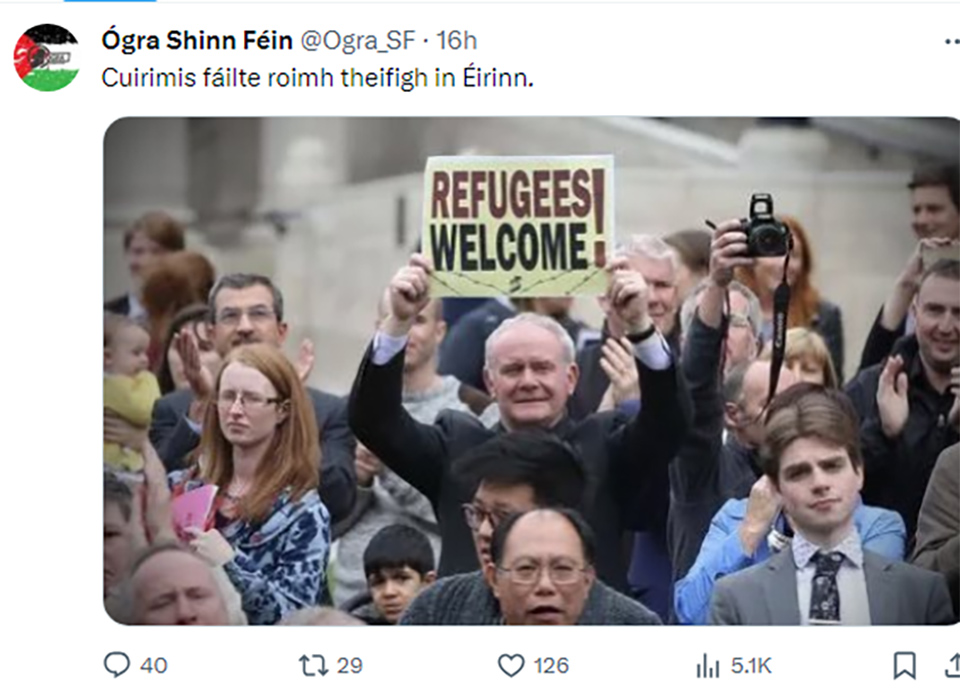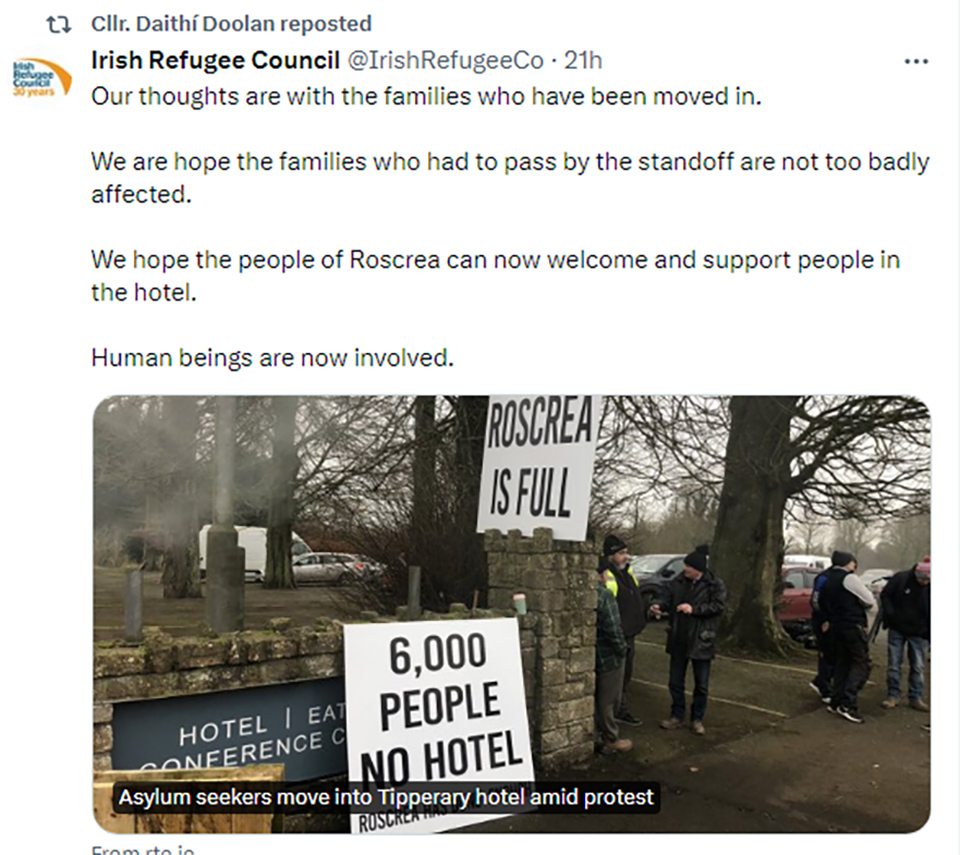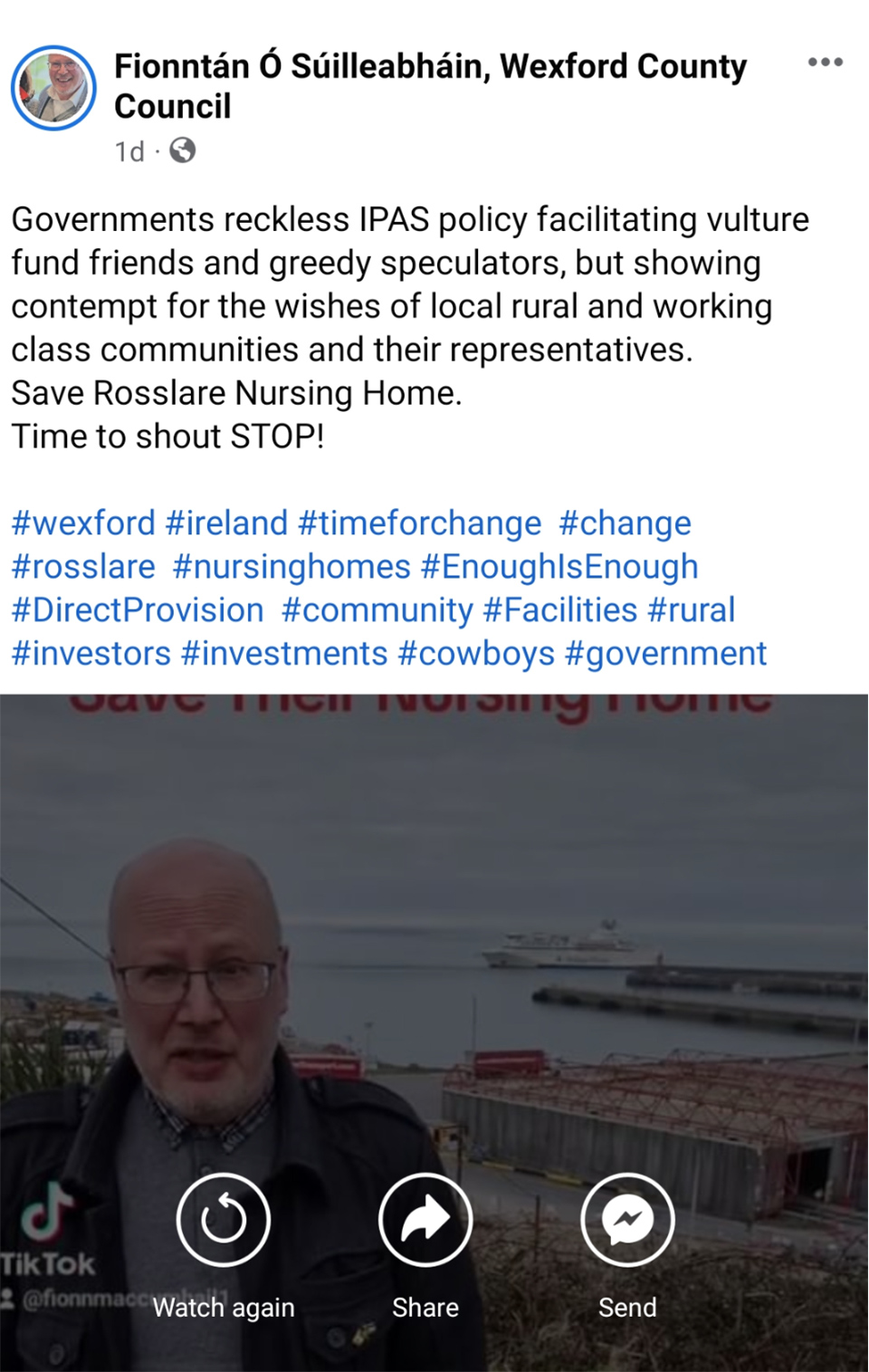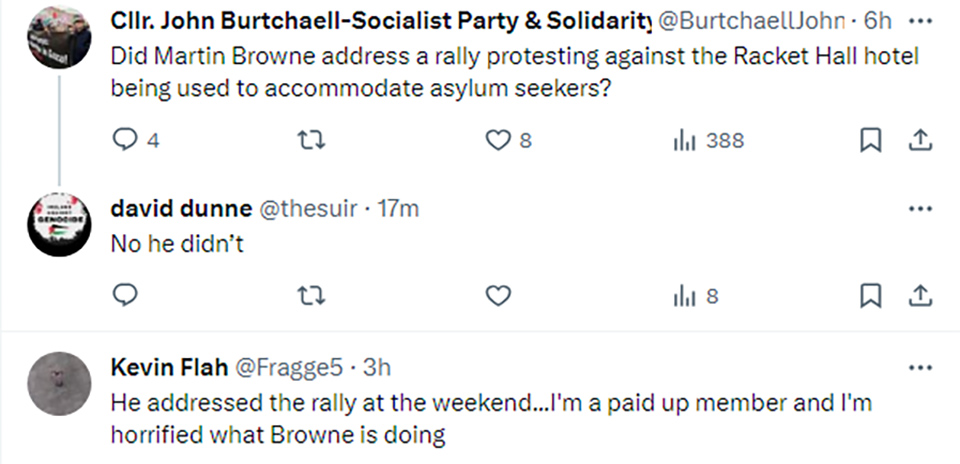Sinn Féin’s growing difficulty in keeping the party together on immigration was illustrated by the reaction to the protest that took place on Monday outside Racket Hall in Roscrea.
While their Tipperary TD Martin Browne attended the protest rally on Saturday and backed the local claim that the loss of the hotel would impact on weddings and other events, and that the Government had “failed to bring communities together,” others unequivocally backed the actions of the Gardaí.
Ógra Shinn Féin pointedly retweeted a photograph of Martin McGuinness holding aloft a Refugees Welcome! placard. This glaring clash that was quickly pointed out by one of those who noticed the young radicals’ defiant rejection of Mary Lou and the Core Group’s most recent messaging on the issue.


In a similar vein, Councillor Daithí Doolan reposted a tweet from the Irish Refugee Council wagging its finger at the Roscrea protestors.
Doolan has been selected as the Sinn Féin candidate for the European Parliament seat in Dublin where immigration and accommodation centres are sure to be an issue. Any crossed signals may cost them any chance of regaining the seat lost in 2019.

In 2004, the “proper authorities” in the movement were able to prevent the liberal lefties associating Sinn Féin with the No side in the Citizenship referendum, a move that might well have ensured a quick end to Mary Lou’s own political career.
Instead, she won a seat in the European elections held on the same day, when tallying proved that most Sinn Féin voters had voted in favour of the “racist referendum” as it is now described by some latter day Shinners.
In that referendum, activists who arrived in with bundles of leaflets printed by whoever was organising the No campaign were not best pleased by being told that under no circumstances were these to be handed out along with Sinn Féin election material.
Just to be on the safe side, any leaflets left in HQ were consigned to the skip out the back – with the approval of one of a senior figure let it be noted.
One wonders if it will be possible for the Core Group to impose similar discipline now, given that the “proper authority” no longer exists, and that the critical mass within the party has shifted decisively to the non-nationalist soft left.
Blanchardstown Sinn Féin activist Al Ó Donaile, and brother of Dublin West TD Paul Donnelly, called for silent Ireland to speak up.
He has no idea as to what “silent Ireland” thinks, but his brother and the other TDs might have a clue if their silence is anything to go by.

The Leinster House group has remained remarkably on message for the most part. This week, they are stressing the party’s opposition to vulture funds buying up houses. That is a worthy object of criticism, but of course the very same interests are often the ones benefiting to some degree from the lucrative contracts being handed out for accommodation centres.
This must be well known to their Finance Spokesperson, Pearse Doherty the Sinn Féin TD for Donegal, who made a great fanfare of welcoming the Vesada Private property developers to Donegal where they now own hotel sites exclusively devoted to the accommodation of refugees.
One of those who has recognised that connection, as many republicans of longer vintage do, has been Wexford Sinn Féin Councillor Fionntán Ó Súilleabháin who has referred directly to the “vulture fund friends and greedy speculators” who are being facilitated by IPAS and the government’s ignoring the concerns of communities such as the one at Rosslare Harbour.

Laois Sinn Féin County Councillor. Aidan Mullins, has also spoken out consistently on the manner in which he sees the system being abused. It is clear that most people can see this, and have not been persuaded otherwise by the consistent attempts to depict them as racists or the dupes of “misinformation”.

The delicate balancing act involved in attempting to play to both sides on the issue is illustrated by signals that any perception of a move to the “right” on immigration risks losing the support or potential support of left liberal voters. A weakness that is already being highlighted by some.


And to make matters worse, the focusing by the far-left and others on Sinn Féin’s panicked efforts to keep all of their potential voter base in the same corral has led to an uncharacteristic airing of differences between members on social media.

All of the main parties face huge challenges on the issue of immigration. Yesterday’s news from Mayo County Council proves that when it comes down to it, that many local representatives will choose their allegiance to their own community above any they might have to their party. Sinn Féin is not immune to that.
None of them are less immune to that than Sinn Féin. However, as a more ideologically centred and driven party, Sinn Féin is far more vulnerable to internal splits on those lines.
They are also an illustration of how the desire for power through the centre conflicts with populist gestures. A Sunday Business Post article at the weekend highlighted a similar dilemma over the party’s tax proposals.
On the one hand they are courting international capital as a “business friendly” party that will not increase corporation tax. On the other they are proposing to impose significant hikes in personal taxation on persons earning incomes over €100,000. This includes a new “solidarity tax” of 3% proposed by them as part of their alternative budget last October. They have also hinted at taxes on pensions and people’s homes.
That amounts to little more than an appeal to the resentment of people who have done well for themselves. It also appears utterly cynical and hypocritical when contrasted to their fawning over American corporations who would be paying less tax than a man or woman who owns a small business, or a person in a good job.
All of this will come under increasing focus one imagines as crucial electoral tests will decide whether Sinn Féin’s claim to be a credible opposition, never mind government, are found to stand up to scrutiny.